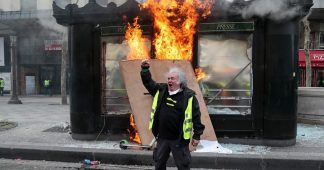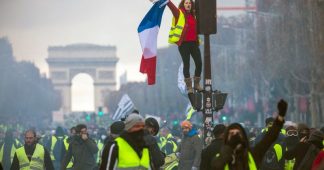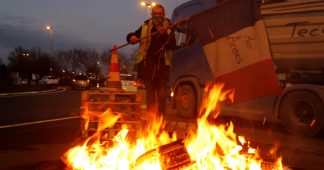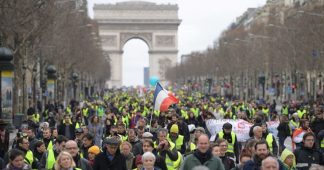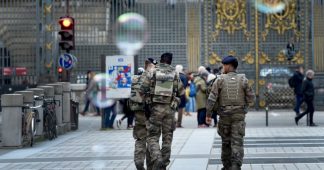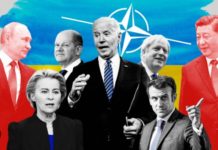Rather than appease protesters with social change, the French government has demonised them as criminals to justify repressive tactics.
By Pauline Bock
21 March 2019
aturday the gilets jaunes (yellow vests) movement will march across France for the nineteenth consecutive week. Since its inception, the police have met the movement with tear gas and weaponry. But this time will be different: France’s anti-terrorist military will be out in force, guarding official buildings and other designated sites.
Yes, you heard that correctly: the French president is bringing in the military to deal with a protest.
The gilets jaunes have been marching for more than four months, come rain or shine, through winter and in fluctuating numbers – but with impressive regularity. They are the most serious social movement in France since 1968 and likely the longest-running insurgency since the French Revolution.
President Emmanuel Macron’s decision to retreat behind the restoration of law and order is the latest in a series of tepid answers to the movement. Rather than confront protesters’ demands for social change, his policies – including the recent decision to mobilise the army – have instead categorised the protestors as an angry mob from which society must be defended.
Macron has made an incendiary move in an explosive situation. While he attempted to quell unrest with a “Great National Debate”, his approach has failed to pacify social and economic tensions – most of the protestors and many of the French population think the great national debate will bring little change.
The debate came to a close on 15 March, one day before the 18th weekly gilets jaunes protest, where clashes between protesters and police in Paris were of similar magnitude to December riots on the Champs-Elysées; luxury shops were looted, a press kiosk destroyed, and the fancy Fouquet’s brasserie was burned in a borderline revolutionary symbol. The French government is justified in seeking solutions to such extreme incidents of violence. Yet sending in the army will do little to help.
“Until now, we were always watching out for misbehaviour, and we wanted to remain careful of avoiding accidents and ensuring people’s security” French Prime Minister Edouard Philippe said on Monday.
“But…extreme violence justifies a firm response. I take this responsibility”, he added. Philippe’s declaration followed theannouncement of new security measures, including harsher sanctions for “casseurs” (“thugs”), surveillance drones and banning marches in Paris’s Champs-Elysées and squares in Bordeaux and Toulouse.
“What these people [gilets jaunes] want… isn’t dialogue,” Philippe said. “Their only demand is violence.” His remarks conveniently overlooked the gilets jaunes’ multiple demands – including economic justice, reforms to the French democratic system, a minimum wage increase and higher corporate taxes. But it is easier to justify repression against a movement that has been demonised.
he government also blamed the violence of the latest protest on the police’s declining use of controversial “LBD” guns. These high-speed rubber bullet guns have severely injured and blinded protesters. Amnesty International, the UN and the Council of Europe have called for them to be banned.
When he heard about the riots in Paris, Macron condemned the gilets jaunes, saying “this isn’t a social movement, but a social destruction movement.” He reportedly termed the protesters a “band of thugs”, adding that law enforcement is an “imperative”.
Can the authorities prevent the situation from escalating? The movement still retains support from 53 per cent of the French population – a figure remarkably high considering the violence of recent protests.
While Macron attempted to save face with new urgency measures in December, he has failed to enact substantive change.
As Sébastien Roché, research director at the French national research lab CNRS told pro-Macron newspaper L’Opinion, the French government has opted for a “dramatisation” of the situation. The government, Roché said, speaks of “factions wanting to overthrow the Republic”, of “criminal acts”, and of a “will to kill”.
“The protesters want to target the places and symbols of power, but to mistake this with an armed insurrection is at the very least an error of estimation”, he said. “This is not civil war.” The lawyer Patrice Spinosi agreed: “There is a will to show that the State is strong,” he told L’Expressmagazine, “but most of the time, repression is only a sign of weakness from a government facing a situation out of its control.”
Quashing the protestors with repression and military might will likely aggravate violence. The majority of the gilets jaunes movement aren’t violent – but even its less radical fringes may consider the Paris riots as “the only efficient way to be heard”, historian Michelle Zancarini-Fournel, who specialises in history of social movements, told France Info.
Indeed, since last November, the government’s response has been reactive, only responding once protests are already out of hand. Violence, for many people, is a means of seeking recognition from a government that remains stubbornly deaf to their concerns. “Rioting is not always emancipating, but regime changes often occur after violent episodes,” Zancarini-Fournel added, quoting Marx’s theory of revolution: “Force is the midwife of every old society pregnant with a new one.”
His contentions were echoed in yellow graffiti daubed on the Apple Store on Champs-Elysees after protests on Saturday 16 March. It read: “15 March 2019: end of the great debate. 16 March 2016: start of the great beginning.”
